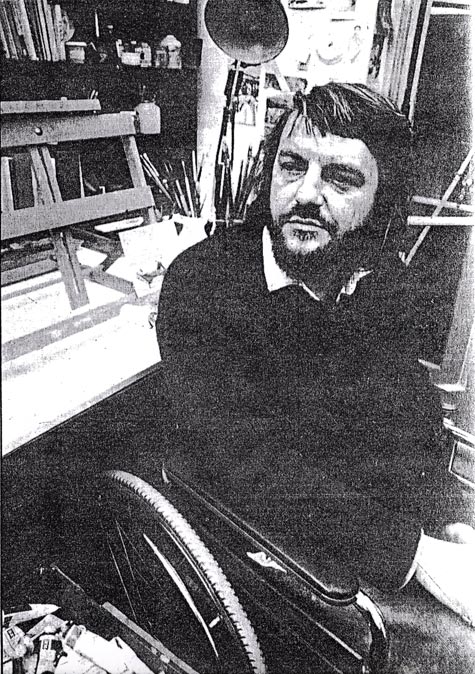| |
|
|
 Of dogs and underdogs - Melody Maker - January 24,
1981 Of dogs and underdogs - Melody Maker - January 24,
1981
ROBERT WYATT had a clearer idea of what he was doing when he wasn't doing
anything, but is getting on with it anyway.
Brian Case reports ; Adrian Boot clicks the shutter
OUTSIDE in the garden, Robert and Alfie's dog Flossie and my dog Titch challenge a clump of hollyhocks. Once they get together, they become deeply unknowable, and tucket about with their ears treaming, baying at imaginary postmen and piddling on each other's possessions.
According to Robert Wyatt, Flossie is the ringleader, a poodle of infinite inventiveness, effortlessly recruiting my suggestible hound to her vision. I would not dispute this, since a few hours with her owner has much the same effect upon me, brain boiling, nose dry, and ears like pennants and all mailmen's ankles in jeopardy.
A man of ravenous intellect, Robert has theories the way rectories have mice, and many a Wyatt wig-bubble has found its way into the field.
Five years ago in Holland, Cecil Taylor buttonholed me to contest Robert's Theory of social Class & Avant-Garde Staying Power.
"You did the interview with that guy in the 'wheelchair? I liked what he said about breathing, but his social ideas were shit. But at last he has ideas."
Mel Tonne reacted as if I had piddled on his possessions when I laid The Theory Of The Limitations Of Scat-Singing on him, and spent half-an-hour in rebuttal, with oo-bla-dee illustrations.
Most of us have opinions, few have ideas, but Robert's prolificity embarrasses him. One New Year's resolution featured incogitance: at chance.
His latest single, a version of Chic's "At Last I Am Free", was in part a broadside in a debate.
PUNDIT
"One of the reasons I wanted to do it was because of a remark made by a pundit on telly. Someone asked him what effect discos had, and he said, 'Well, of course, the black ballad tradition's gone down the drain. They're all trying to boogie now'. I thought THAT JUST ISN'T TRUE! There is so much black boogie in the front line of the dance thing at the moment - but there's also as much as ever of the song and ballad stuff. This song is an example of that."
Humbug and bad ideas will not pass into the currency unchallenged, and I have an evergreen memory of Robert crouched over the radio, teapot suspended in indignation at the radical chic of a disc jockey. “Rock Against Sexism? He may as well propose Omelettes Against Eggsism!”
"The other reason why I wanted to do 'At Last I Am Free' is because I like the tune. There's a nice cycle of chords with a couple of nice melodic things that almost inevitably grow out of it. Just water it with a nice bass line or something.
"I'm very bad at words. I don't very often listen to words. I tend to listen to music from the bottom upwards, rhythm section upwards. In this case, I listened to it and thought, what on earth is this? The chorus goes 'Now at last I'm free' — yes, well, that's a great feeling, that's good - but the verse is a bitter and miserable let-down. The gist of it is a betrayal, and the chorus is 'Hooray, made it!' I thought, COR - that's right up my street!
"My voice always comes out disappointed, to say the least. I've got that sort of sound. It's too lugubrious to be a hit. Nothing I could do would ever cheer anybody up, and I don't even sound fashionably down. So, if I sing 'At Last I Am Free' it wouldn't sound as if I meant it anyway, and that would suit the sense. I got Frank Roberts to do the piano, and I just did what I liked about it, and left the rest out."
AFTER a long period of musical inactivity, Robert is back recording again with a series of fascinating singles for Rough Trade.
"I've had a difficult year. Maybe I'm a malcontent, but at least when I wasn't working, I knew what I was doing. I could handle that.
"I can't graft all the experiences and thoughts that I've had since I dropped the craft on to what I remember of the craft. I know lots of things I didn't use to know, but they're not specifically about how to make better records. If anyone told me they'd been doing something for five years and felt really disillusioned and wanted to give it a break and go off and do something else, I'd say something like DON'T. Stick to whatever it is you can do, because you have to grow through whatever it is that you do ..."
To say that he has watched the manipulations of popular culture from his wheelchair implies the loftiness of the umpire. Nothing could be further from the truth, for Robert's irreduceable ideas came by way of gnawing concern, doubt and guilt to the cuticle, and are invariably presented without wishing to presume.
"The new English rock bands that took the headlines in "78 struck me as a nostalgia movement for the days when rock was dangerous music, or seen as a dangerous music. It has always had the reputation of so being, and that's always been one of the assumptions about it that you can knock to pieces if you try.
"Nevertheless, it's part of the self-image of people in rock that they're part of the rebel culture, and the industry loses its bearings when it's too obvious that this isn't the case. I used to belong to the consensus myth that if you played iconoclastic music, you were being iconoclastic. I hadn't realised the extent to which that just isn't true.
"The whole cultural set-up absolutely caters for that, and knows how to absorb it completely. It's part of it, it's no threat to anything — in fact, it's part of how the cultural business keeps churning.' There was something charmingly nostalgic about the idea that these punks were REALLY gonna do it, REALLY gonna blow the gaff! The pathos of it!
"A lot of the cultural things that I have become interested in remind me of the title of Mingus' book, 'Beneath The Underdog'. Very often when things reach rock culture and become famous underdog symbols, they've already come up one from the underdog to become acceptable." In the history of rock 'n' roll this is racist.
"In America you had all this raging, raving black music right through the Forties, which was in fact rock 'n' roll — the economy small groups that came out of the big bands with a tenor at the front, and a compere-cum-singer and two rhythm. The history of rock 'n' roll is a history of Saturday night working men's clubs in black America, and the Forties is the rock 'n' roll era.
«IT wasn't about famous people or eccentrics or heart-throbs until it coincided with a staggering, uncertain, ailing Hollywood industry not sure how its new star should look. It is always taken for granted as perfectly acceptable that Sam Phillips could say, 'If I could find a white man who had the Negro sound and the Negro feel, I could make a billion dollars'. I'm not blaming Elvis and I'm not even saying white musicians are not equally creative - I'm just saying THAT'S the history of it, then look at the rock industry's propaganda for how it sees itself. Dangerous music!
AMERICA
"I sometimes think South Africa is the only really honest Western country because there everybody says, 'Right — the blacks' job here is to provide cheap raw material for our sophisticated industries'. America has some sort of pretence that this isn't so.
"I heard a popular historian on the radio this morning describing the five great stages of American popular music, and it went from Al Jolson, Bing Crosby, Frank Sinatra, Elvis Presley to the Beatles. Well - come ON, you know! I mean, those are the stages at which it reached the white, respectable, monied American public — when underdog characteristics became acceptable. But the real underdog is STILL playing janitors in the movies. It's going on unabated."
This is one of our long-standing points of agreement, and we sometimes derive a bilious satisfaction from comparing the time-lag between black and white cultures — "Disco! Ten years; New Wave! Twenty" — before bunging on a jazz record. This time, however, Robert ventures further into the process.
DESPAIR
"A very good example of all this — and it spreads despair because it seems so endless and historical — is the history of the waltz. You had the travelling gypsy musicians in middle Europe getting all the racist abuse, the settler's fear of the nomad coming into that as well — this unacceptable group doing this ' naughty music. In fact, they were living deeply moral and cautious lives. Romany law is fantastically strict in terms of sexual habits and relationships, very, very formal, has to be for the culture to survive.
"Anyway, to the European outsider, they looked loose, outrageous and dangerous to civilisation. Eventually, a respectable light composer took up their waltz, fitted those Oriental lines into the European piano structure, dampened it down and created the newly sterilised, sanitised waltz, and suddenly it was all right for nice people to dance to.
|

|
"Does this give the gypsies respectability?
Nobody'd heard of the waltz till it was put on the map by respectable people, so that moment of triumph of the culture was about as useful to the gypsies as a lion's head is in the trophy room of the hunter. He's got there, but . . . THAT'S the process that we're dealing with in rock 'n' roll. It's what happens. Winner takes all.
"THE West happens to represent an amazingly powerful force in terms of revolutionising other people's lives. In the end, it's quite a relief to be able to say that my position isn't a moral one, it's aesthetic. That is to say I actually LIKE the idea of this great wealth and variety of ways there are for being people in the world.
"Even though we pretend the colonial period is over, we are steam-rollering the whole world into thinking that the ONLY way to be is something like us. We in the West seem to know when we NEED to assimilate somebody else's culture, and we are able to do that and create our plural society, and leave people nothing.
"I find the creation of this vast mono-culture alarming. Everybody in the world is trying to match up to this great impregnable fortress that Western civilisation has created with its vast technological and military backup, and air of moral and spiritual superiority. "It flattens and belittles everything.
"There's a great Bulgarian poem called 'The Shot That Wounds But Does Not Kill'. It's about a decoy duck, a duck that the hunter clips, takes to the marshes where it cries to its mates who come down and get shot. I'm not talking about the West exterminating people or cultures, but allowing them to survive with clipped wings. Like rock 'n' roll."
|




